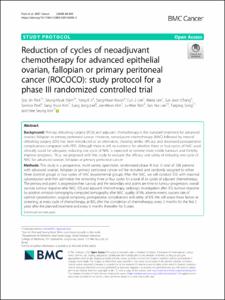KUMEL Repository
1. Journal Papers (연구논문)
1. School of Medicine (의과대학)
Dept. of Obstetrics & Gynecology (산부인과학)
Reduction of cycles of neoadjuvant chemotherapy for advanced epithelial ovarian, fallopian or primary peritoneal cancer (ROCOCO): study protocol for a phase III randomized controlled trial
- Affiliated Author(s)
- 권상훈
- Alternative Author(s)
- Kwon, Sang Hoon
- Journal Title
- BMC cancer
- ISSN
- 1471-2407
- Issued Date
- 2020
- Keyword
- Ovarian; Fallopian; Peritoneal; Cancer; Neoadjuvant chemotherapy; Cycle
- Abstract
- Background:
Primary debulking surgery (PDS) and adjuvant chemotherapy is the standard treatment for advanced ovarian, fallopian or primary peritoneal cancer. However, neoadjuvant chemotherapy (NAC) followed by interval debulking surgery (IDS) has been introduced as an alternative, showing similar efficacy and decreased postoperative complications compared with PDS. Although there is still no evidence for whether three or four cycles of NAC used clinically could be adequate, reducing one cycle of NAC is expected to remove more visible tumours and thereby improve prognosis. Thus, we proposed with this study to evaluate the efficacy and safety of reducing one cycle of NAC for advanced ovarian, fallopian or primary peritoneal cancer.
Methods:
This study is a prospective, multi-centre, open-label, randomized phase III trial. A total of 298 patients with advanced ovarian, fallopian or primary peritoneal cancer will be recruited and randomly assigned to either three (control group) or two cycles of NAC (experimental group). After the NAC, we will conduct IDS with maximal cytoreduction and then administer the remaining three or four cycles for a total of six cycles of adjuvant chemotherapy. The primary end point is progression-free survival, and the secondary end points are time to tumour progression, overall survival, tumour response after NAC, IDS and adjuvant chemotherapy, radiologic investigation after IDS, tumour response by positron emission tomography-computed tomography after NAC, quality of life, adverse events, success rate of optimal cytoreduction, surgical complexity, postoperative complications and safety of IDS. We will assess these factors at screening, at every cycle of chemotherapy, at IDS, after the completion of chemotherapy, every 3 months for the first 2 years after the planned treatment and every 6 months thereafter for 3 years.
Discussion:
We hypothesize that reducing one cycle of NAC will contribute to more resection of visible tumours despite 10% reduction of optimal cytoreduction, which could improve survival. Moreover, two cycles of NAC may increase postoperative complications by 5% compared with three cycles, which may be acceptable.
- Department
- Dept. of Obstetrics & Gynecology (산부인과학)
- Publisher
- School of Medicine (의과대학)
- Citation
- Soo Jin Park et al. (2020). Reduction of cycles of neoadjuvant chemotherapy for advanced epithelial ovarian, fallopian or primary peritoneal cancer (ROCOCO): study protocol for a phase III randomized controlled trial. BMC cancer, 20(1), 385. doi: 10.1186/s12885-020-06886-2
- Type
- Article
- ISSN
- 1471-2407
- Appears in Collections:
- 1. School of Medicine (의과대학) > Dept. of Obstetrics & Gynecology (산부인과학)
- 파일 목록
-
-
Download
 oak-2020-0194.pdf
기타 데이터 / 636.98 kB / Adobe PDF
oak-2020-0194.pdf
기타 데이터 / 636.98 kB / Adobe PDF
-
Items in Repository are protected by copyright, with all rights reserved, unless otherwise indicated.